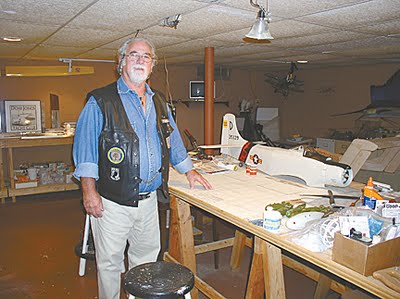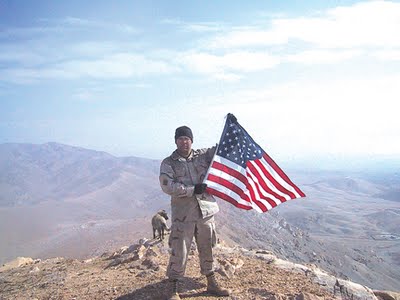Sanford Kaplan
A teenage aviation hobby turned into a military profession.
By Petra Chesner Schlatter, BucksLocalNews.com

Warrant Officer 2 Sanford “Sandy” Noel Kaplan, 70, served in both the U.S. Air Force and the U.S. Army during the Vietnam War. He flew helicopters in the Army, but surprisingly was not permitted to fly aircraft in the Air Force because he did not have a college degree. However, he was a trained pilot.
Ironically in the Air Force, he taught the use of full pressure suits (space suits).
Kaplan started flying when he was 13 in the early 1950s. He said in those days, you could rent a plane for $35 and your age didn’t matter. He was designing model aircraft before that. Flying was in his blood. It still is.
In his retirement, he spends countless hours in his basement meticulously constructing large model aircraft from as early as the World War I era.
In 2002, Kaplan retired from Dow Jones. He made a career as a professional pilot. “I became their chief pilot and general aviation manager,” he said, noting he flew 26 years and was chief pilot for 13 years.
Today, he prides himself as being a member of the motorcycle group, the American Legion Riders, and part of the committee to build a veterans’ monument in Lower Makefield Township.
In fact, two of his model aircraft will be auctioned to benefit the monument and park at Makefield Highlands Golf Course on Saturday, Nov. 7 from 7 to 10:30 p.m.
The aircraft, a Mohawk and a Sky Raider, are both hand-painted by Kaplan in Vietnam color and markings. Other models constructed by Kaplan were donated to museums. The first model he donated was valued at $10,000.
Looking back, Kaplan said he enlisted in the Air Force “to avoid the draft.” He was with the Air Force for 2 1/2 years. “My profession was physiological training instructor,” he said. “You teach essentially space suits, ejection seats, parachutes, oxygen equipment, low pressure chambers and hyperbaric chambers.
“One of my students was a general in the Army,” Kaplan said. He knew of Kaplan’s flying experience, and that he had all of the credentials and certification prior to the Air Force.
The general offered Kaplan a “job” in the Army as a pilot. “One day I was an Airman 2nd [with two stripes] and the next day I was in the Army as a warrant officer,” he said, chuckling. “Specialized officers have only one specific job. In my case, it was Flying/Warrant 2.
“I flew helicopters when I was in the Army,” Kaplan said. “I [had told the Air Force that] I was an airplane pilot, but they ignored that. That’s typical military stuff.”
He had joined the Air Force “to stay away from what they called the grunt army which was infantry – carrying a rifle.
“I agreed in doing whatever they told me to do,” Kaplan said. “All I knew was I wanted to fly...Essentially, I volunteered in the Army under the direction of this general.”
Kaplan remembers the Battle of Ira Drang Valley in November 1965. “It was probably one of the first large battles that we encountered the Vietnamese army,” he said. “That was probably the most notable battles that they had in Vietnam. The 1st Air Cavalry was interested in getting into battles. They made a mistake going in prematurely.
“The 52nd Aviation Batallian had to rescue the 1st Air Cavalry and in short we got our butts shot off,” he said. “That battle is when I received my order that I could go back to the United States. We were all required to serve 12 months in Vietnam and mine was completed in ‘65.
“When I first went into Vietnam, we were doing one combat mission a day,” he noted. “When I completed my tour in Vietnam, we were doing three a day — all kinds of ground fire. The activity picked up substantially.
“We did what we were supposed to do — either single ship missions or full-company which was 25 helicopters,” he continued. “We brought troops in. We used armed helicopters...We shot up the ground.”
The enemy, the Viet Cong, “kept their heads down...They wouldn’t ‘raise their heads’ to shoot back at you.”
From time to time, Kaplan flew as a Medivac pilot. “Just bringing out the wounded and dead Americans was not only very sad, but it made you feel like you were accomplishing something,” he said.
Kaplan said he is “absolutely” patriotic. “Part of it is I was in the military and you form relationships,” he noted. “They call it comeraderie with other pilots or GIs. Because of the threat of harm each and every day, it’s a very special relationship. You feel very proud to be one of the group who serves their country.”
By Petra Chesner Schlatter, BucksLocalNews.com

Warrant Officer 2 Sanford “Sandy” Noel Kaplan, 70, served in both the U.S. Air Force and the U.S. Army during the Vietnam War. He flew helicopters in the Army, but surprisingly was not permitted to fly aircraft in the Air Force because he did not have a college degree. However, he was a trained pilot.
Ironically in the Air Force, he taught the use of full pressure suits (space suits).
Kaplan started flying when he was 13 in the early 1950s. He said in those days, you could rent a plane for $35 and your age didn’t matter. He was designing model aircraft before that. Flying was in his blood. It still is.
In his retirement, he spends countless hours in his basement meticulously constructing large model aircraft from as early as the World War I era.
In 2002, Kaplan retired from Dow Jones. He made a career as a professional pilot. “I became their chief pilot and general aviation manager,” he said, noting he flew 26 years and was chief pilot for 13 years.
Today, he prides himself as being a member of the motorcycle group, the American Legion Riders, and part of the committee to build a veterans’ monument in Lower Makefield Township.
In fact, two of his model aircraft will be auctioned to benefit the monument and park at Makefield Highlands Golf Course on Saturday, Nov. 7 from 7 to 10:30 p.m.
The aircraft, a Mohawk and a Sky Raider, are both hand-painted by Kaplan in Vietnam color and markings. Other models constructed by Kaplan were donated to museums. The first model he donated was valued at $10,000.
Looking back, Kaplan said he enlisted in the Air Force “to avoid the draft.” He was with the Air Force for 2 1/2 years. “My profession was physiological training instructor,” he said. “You teach essentially space suits, ejection seats, parachutes, oxygen equipment, low pressure chambers and hyperbaric chambers.
“One of my students was a general in the Army,” Kaplan said. He knew of Kaplan’s flying experience, and that he had all of the credentials and certification prior to the Air Force.
The general offered Kaplan a “job” in the Army as a pilot. “One day I was an Airman 2nd [with two stripes] and the next day I was in the Army as a warrant officer,” he said, chuckling. “Specialized officers have only one specific job. In my case, it was Flying/Warrant 2.
“I flew helicopters when I was in the Army,” Kaplan said. “I [had told the Air Force that] I was an airplane pilot, but they ignored that. That’s typical military stuff.”
He had joined the Air Force “to stay away from what they called the grunt army which was infantry – carrying a rifle.
“I agreed in doing whatever they told me to do,” Kaplan said. “All I knew was I wanted to fly...Essentially, I volunteered in the Army under the direction of this general.”
Kaplan remembers the Battle of Ira Drang Valley in November 1965. “It was probably one of the first large battles that we encountered the Vietnamese army,” he said. “That was probably the most notable battles that they had in Vietnam. The 1st Air Cavalry was interested in getting into battles. They made a mistake going in prematurely.
“The 52nd Aviation Batallian had to rescue the 1st Air Cavalry and in short we got our butts shot off,” he said. “That battle is when I received my order that I could go back to the United States. We were all required to serve 12 months in Vietnam and mine was completed in ‘65.
“When I first went into Vietnam, we were doing one combat mission a day,” he noted. “When I completed my tour in Vietnam, we were doing three a day — all kinds of ground fire. The activity picked up substantially.
“We did what we were supposed to do — either single ship missions or full-company which was 25 helicopters,” he continued. “We brought troops in. We used armed helicopters...We shot up the ground.”
The enemy, the Viet Cong, “kept their heads down...They wouldn’t ‘raise their heads’ to shoot back at you.”
From time to time, Kaplan flew as a Medivac pilot. “Just bringing out the wounded and dead Americans was not only very sad, but it made you feel like you were accomplishing something,” he said.
Kaplan said he is “absolutely” patriotic. “Part of it is I was in the military and you form relationships,” he noted. “They call it comeraderie with other pilots or GIs. Because of the threat of harm each and every day, it’s a very special relationship. You feel very proud to be one of the group who serves their country.”
 RSS Feeds
RSS Feeds




